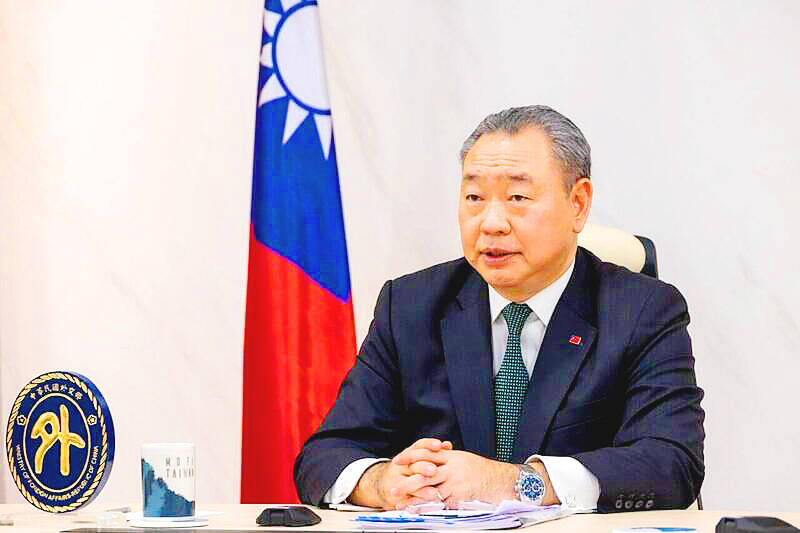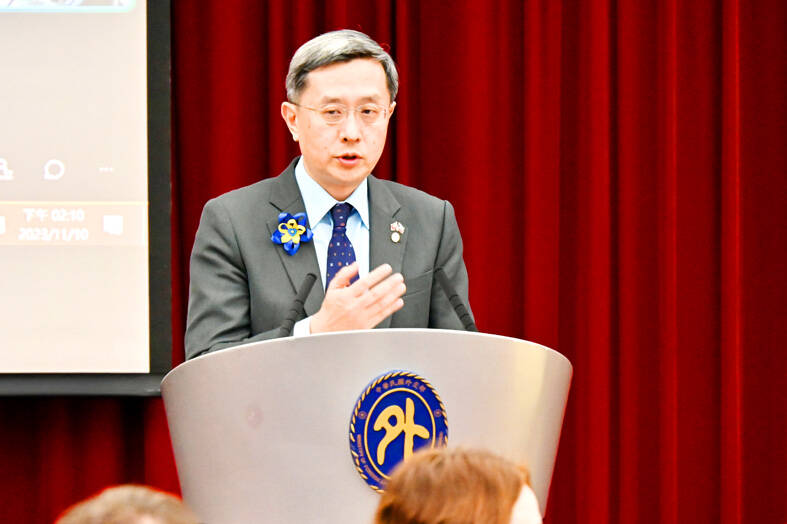Former vice minister of foreign affairs and top envoy to the EU Alexander Yui (俞大㵢) has been appointed representative to the US, replacing Hsiao Bi-khim (蕭美琴), who resigned to join Vice President William Lai (賴清德) as his running mate on the Democratic Progressive Party’s presidential ticket.
Hsiao earlier this week returned to Washington to bid farewell to her colleagues and hand over her duties before returning to campaign for January’s elections.
Deputy Minister of Foreign Affairs Roy Lee (李淳) has been appointed as representative to the EU and Belgium, to succeed Yui, Presidential Office spokeswoman Olivia Lin (林聿禪) said.

Photo: Chen Yun, Taipei Times
“The US is Taiwan’s most important partner in the international community. Both sides have maintained a good friendship and extensive ties in the past few years, while closely collaborating in many sectors,” Lin said.
President Tsai Ing-wen (蔡英文) appointed Yui based on his diplomatic experience serving in numerous countries over his career, allowing him to immediately step into his new role to further boost Taiwan-US relations, Lin said.
Yui has previously served in Paraguay, Geneva, El Salvador and New York, was head of the foreign ministry’s Department of Latin America and Caribbean Affairs, and was vice foreign minister for about two years.

Photo: George Tsorng, Taipei Times
He has promoted trilateral links and exchanges among Taiwan, the US and Latin America, helping to expand the scope of Taiwan’s foreign affairs initiatives and establish wide-ranging networks among the English-speaking and Spanish-speaking diplomatic circles of the Americas, Lin said.
Yui has a bachelor’s degree in political science and modern languages, and a master’s degree in Spanish literature from Texas A&M University.
After serving as Taiwan’s de facto ambassador to the US for three years, Hsiao tendered her resignation last week, which was approved by Tsai and takes effect today.
Hsiao on Tuesday wrote on X, formerly Twitter, that it had been “an honor” to represent Taiwan in the US.
“As I embark on another challenging path, I am truly grateful to all who have worked with me to strengthen the Taiwan US partnership over the last three years,” she wrote.
“Taiwanese diplomats can never take support for granted. We know we must earn it and work for it,” she said, adding that she would “miss the cherry blossoms and colorful foliage of DC,” as well as “the warmth of bipartisan friends who have committed to stand with Taiwan.”

CHAOS: Iranians took to the streets playing celebratory music after reports of Khamenei’s death on Saturday, while mourners also gathered in Tehran yesterday Iranian Supreme Leader Ayatollah Ali Khamenei was killed in a major attack on Iran launched by Israel and the US, throwing the future of the Islamic republic into doubt and raising the risk of regional instability. Iranian state television and the state-run IRNA news agency announced the 86-year-old’s death early yesterday. US President Donald Trump said it gave Iranians their “greatest chance” to “take back” their country. The announcements came after a joint US and Israeli aerial bombardment that targeted Iranian military and governmental sites. Trump said the “heavy and pinpoint bombing” would continue through the week or as long

TRUST: The KMT said it respected the US’ timing and considerations, and hoped it would continue to honor its commitments to helping Taiwan bolster its defenses and deterrence US President Donald Trump is delaying a multibillion-dollar arms sale to Taiwan to ensure his visit to Beijing is successful, a New York Times report said. The weapons sales package has stalled in the US Department of State, the report said, citing US officials it did not identify. The White House has told agencies not to push forward ahead of Trump’s meeting with Chinese President Xi Jinping (習近平), it said. The two last month held a phone call to discuss trade and geopolitical flashpoints ahead of the summit. Xi raised the Taiwan issue and urged the US to handle arms sales to

BIG SPENDERS: Foreign investors bought the most Taiwan equities since 2005, signaling confidence that an AI boom would continue to benefit chipmakers Taiwan Semiconductor Manufacturing Co’s (TSMC, 台積電) market capitalization swelled to US$2 trillion for the first time following a 4.25 percent rally in its American depositary receipts (ADR) overnight, putting the world’s biggest contract chipmaker sixth on the list of the world’s biggest companies by market capitalization, just behind Amazon.com Inc. The site CompaniesMarketcap.com ranked TSMC ahead of Saudi Aramco and Meta Platforms Inc. The Taiwanese company’s ADRs on Tuesday surged to US$385.75 on the New York Stock Exchange, as strong demand for artificial intelligence (AI) applications led to chip supply constraints and boost revenue growth to record-breaking levels. Each TSMC ADR represents

Pro-democracy media tycoon Jimmy Lai’s (黎智英) fraud conviction and prison sentence were yesterday overturned by a Hong Kong court, in a surprise legal decision that comes soon after Lai was jailed for 20 years on a separate national security charge. Judges Jeremy Poon (潘兆初), Anthea Pang (彭寶琴) and Derek Pang (彭偉昌) said in the judgement that they allowed the appeal from Lai, and another defendant in the case, to proceed, as a lower court judge had “erred.” “The Court of Appeal gave them leave to appeal against their conviction, allowed their appeals, quashed the convictions and set aside the sentences,” the judges